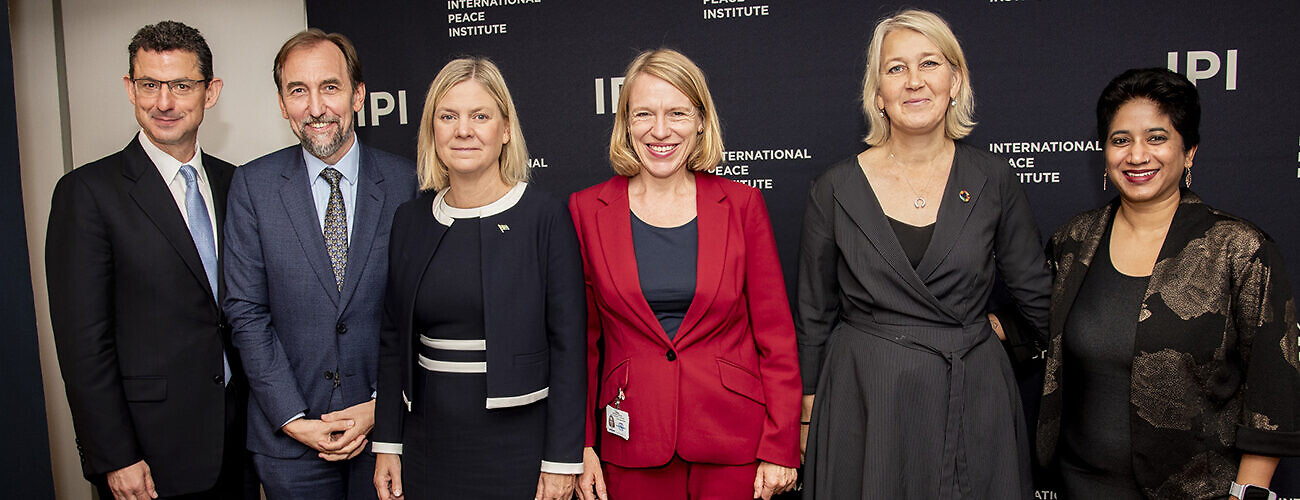IPI together with the Norwegian Ministry of Foreign Affairs cohosted the thirteenth annual Trygve Lie Symposium on September 21st on the topic of “Civil Society’s Crucial Contribution to Promoting and Protecting Human Rights.” The event took on a particularly urgent tenor this year as recent attacks on human rights all over the world were juxtaposed against the 75th anniversary of the Universal Declaration of Human Rights and the 25th anniversary of the adoption of the UN Declaration on Human Rights Defenders.
The discussion focused on recognizing the contributions of civil society in the fight for human rights. Panelists addressed contemporary threats to fundamental freedoms and the interrelated challenge of repression of civil society towards the essential questions of the event: Why is civil society getting weaker? And what can we do to strengthen it in the struggle for human rights?
Key to understanding the increased repression of civil society is an analysis of the factors that have contributed to recent attacks on human rights and human rights defenders. H.E. Anniken Huitfeldt, Minister of Foreign Affairs of Norway, provided the necessary framework. She opened with a reflection on 75 years of progress in fulfilling human rights but contrasted this progress with the rise of authoritarianism and democratic backsliding in the last decade. All speakers made clear that under authoritarian governments, disinformation campaigns, pushback against women’s and LGBTIQ+ rights, impunity for rights violations, concerted attacks against journalists and free speech, and military aggression thrive.
While the weakening of democratic institutions is tied to the rise of authoritarian tactics, panelists articulated the way a strong and supported civil society sector goes hand in hand with a strong democracy. Hina Jilani, Member of The Elders, illustrated the full scope of the kind of antidote to authoritarianism that civil society can be in her remarks: “Human rights defenders are not only a part of strengthening democracy, they are an indication of democratization itself and a model of further development.” Within this relationship between civil society and democracy, Lysa John, Secretary-General of CIVICUS identified how an explosion of civic action has been met with equal levels of repression and backlash. Calling 2020, “the year of censorship and surveillance,” she highlighted recent attempts to restrict dissent and the great threat that a loss or weakening of our fundamental freedoms of assembly and expression pose to civic organizing.
As the conversation came to a close, speakers provided strategies to combat the tactics deployed against civil society. Ulrika Modéer, UN Assistant Secretary-General highlighted the kind of intersectional approach that can maximize the contributions of civil society if the private sector and increased funding is leveraged to build greater institutional support. Zane Dalgor, Director-General of the Department of International Relations and Cooperation of South Africa offered an important reminder not to romanticize or generalize when we invoke “civil society” because it is not homogenous. Instead, he called for a deeper analysis of the financial backing of certain organizations and a closer look at the weakening of progressive civil society as a way of analyzing how authoritarian governments may be instrumentalizing civic organizations.
Opening Remarks:
Zeid Ra’ad Al Hussein, President and CEO of the International Peace Institute
Speakers:
H.E. Anniken Huitfeldt, Minister of Foreign Affairs, Norway
Hina Jilani, Member of The Elders, Advocate at the Supreme Court of Pakistan, Member of the High-Level Panel of Legal Experts on Media Freedom, and founder of Pakistan’s first all-women law firm, as well as Pakistan’s first Legal Aid Center and the Women’s Action Forum (Virtual)
Lysa John, Secretary-General of CIVICUS
Ulrika Modéer, UN Assistant Secretary-General and Director of the Bureau of External Relations and Advocacy, UNDP
Moderator:
Douglas Rutzen, President of the International Centre for Not-For-Profit Law (ICNL)








